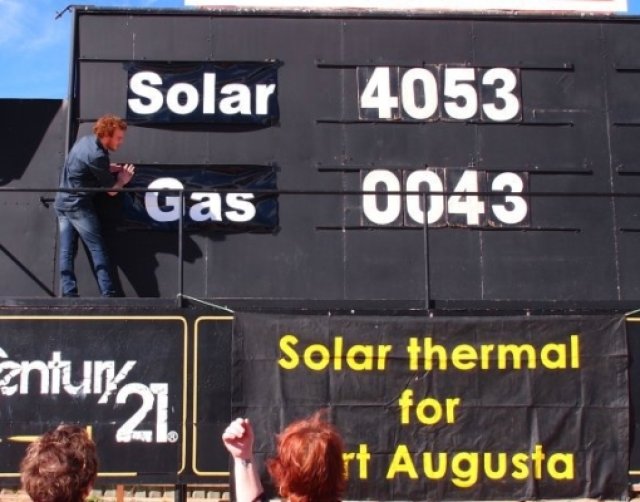
We are facing a climate emergency. The impacts of increasing extreme weather events are already being felt around the world and the unprecedented record Arctic sea ice melt highlights the urgent need to transition away from fossil fuels.
Shamefully, it is in this context that new coal and gas projects continue to be approved, and the federal government plans to give $4.5 billion in free carbon permits to the country’s dirtiest coal-fired power stations. This money should be put into building large-scale renewable energy, like solar thermal power for Port Augusta.
Port Augusta in South Australia is the centre of a momentous campaign to replace the two ageing coal-fired power stations there with renewable energy. This is possible with six solar thermal power stations with storage and 90 wind turbines. This combination could replace the energy output of the coal-fired plants, providing 24-hour baseload power.
Switching to renewables in Port Augusta would have huge benefits for the local community. Solar thermal would create 1800 jobs, far more than a gas-fired power station would provide. Solar power would also alleviate the health problems that the people of Port Augusta suffer as a result of pollution from burning coal.
The Port Augusta community made it clear in a recent community vote what type of energy future they want for their town: 4053 voted for solar thermal and only 43 for gas.
The Repower Port Augusta campaign is historic for several reasons. First is its ability to mobilise support and its potential to win. At a time when the climate movement nationally has been in a downturn, this campaign has continued to involve activists and the wider community in large numbers.
Although it is by no means inevitable, Port Augusta is likely to be our best chance to get solar thermal with storage built in Australia.
The campaign has been strongly focused on building grassroots support. The most powerful displays of people power have been the community vote and the Walk for Solar from Port Augusta to Adelaide that ended on September 30.
The formation of the Repower Port Augusta Alliance is also highly significant. The alliance involves a range of groups and organisations working together as a united front to campaign for solar thermal for Port Augusta.
It is almost unprecedented to see environment groups with varying political and strategic approaches working together so effectively. It’s a great step forward for the environment movement.
The Repower Port Augusta campaign has brought together youth activists, unions, socialists, environmentalists, community members, local councils and business groups to fight for a common cause.
Socialist Alliance members in South Australia have been active in this campaign from the beginning. As part of the Climate Emergency Action Network (CLEAN) SA members have travelled to Port Augusta to help campaign around the issue.
The Socialist Alliance’s Climate Charter says we need to transition away from fossil fuels to renewable energy at emergency speed and supports a target of 100% renewable energy by 2020.
Building solar thermal in Port Augusta would be a great first step toward this national transition, and would open the door to more build solar thermal plants around the country.
We must continue to fight for a sustainable and just future that puts people and the planet before profits – and the Repower Port Augusta campaign is a great example of how we can do this.